Opinions & Interviews
Belarusian economy changes naturally, presidential aide says

MINSK, 3 November (BelTA) – Belarus is no stranger to reforms, the national economy changes naturally. Aide to the Belarus President Kirill Rudy made the statement during the conference Belarus Economy: At a Tipping Point on 3 November, BelTA has learned.
“Belarus is no stranger to reforms. One cannot say with absolute confidence that nothing has happened in the country in the last few years, that time is frozen somehow here, and no attempts have been made. The economy changes in a natural way. The private sector emerges and grows, small business is on the rise, foreign investors come to Belarus,” noted the Aide to the Belarus President.
In his words, government agencies constantly try to push for structural reforms in accordance with their understanding and their capability. For instance, priorities are outlined and receive the relevant resources. Kirill Rudy reminded that special interagency working groups were set up in 2013-2014 to reform entire branches of the national economy. A number of directives and decrees have been passed to encourage entrepreneurship, develop and support the private sector in small and medium towns. “You have to be objective and say that reforms go on. The fact that reforms are possible is the key result,” noted Kirill Rudy.
The Aide to the Belarus President stressed that the need for reforms is not evident for the general public. “It seems to me that the general public associates reforms with reforms of the Soviet Union but it is difficult to compare the shortage of foods and non-foods in the USSR times with what is going on in Belarus. It is difficult to compare with the Singapore of the year 1960, with the China of the 1970s when migration and mass hunger happened. Those factors definitely urged the authorities to go ahead with truly serious structural reforms. There is nothing like that in Belarus, this is why I see no obvious public demand for reforms apart from demands of a small number of specialists,” explained Kirill Rudy.
He said he believes that reforms are not obvious for civil servants either since competent, responsible officials often receive incomplete real information or the information is distorted to a degree.
Kirill Rudy said he believes that there are no external incentives for reforms in Belarus. In his words, the desire to join the European Union was the incentive for reforms in Central and Eastern Europe. “But all the countries suspended their reforms after joining the European Union except for Latvia. Some of them even returned to a form of administration less dependent on market principles,” he stated.
Speaking about external incentives that encourage reforms in Belarus, the expert mentioned economic slowdown in the region, falling oil prices, and Russia’s growing influence. Kirill Rudy said the country has lived in these conditions for years.
In his words, the government is overburdened with routine affairs and has no strength or time to make strategic decisions. Apart from that, it is important who will implement the reforms.
Kirill Rudy mentioned three conditions that can allow reforms to go ahead, including in Belarus. “I believe the general public needs to be involved. Constant awareness-raising efforts are necessary as well as regular explanations, transparency. Both the implementation of decisions and how the decisions are made have to be transparent. Everyone needs to understand what we are looking forward to, what the reforms are all about and what they will bring about. Economists should play the enlightening role,” he noted.
The demand of the middle class for reforms is the second condition mentioned by Kirill Rudy. In his words, the middle class is unstable in Belarus considering changes of the currency exchange rate and changes in revenues. According to the Economy Ministry, in January-May 2014 the share of the middle class in Belarus stood at 49%. In May 2015 the figure was 39% while the world’s average varies from 50% to 70%. “It is necessary to grow the middle class,” believes Kirill Rudy.
The Aide to the Belarus President said that the political elite’s demand for reforms is the third condition. “We’ve seen a certain shift of generations in the central government, the central bank in the last few years. Moreover, the government and the National Bank have been forming economic reform programs since 2013 regardless of who leads them. One can say a change of mentality has occurred. They suggest reforms. This is why every year reforms are worked out not for the sake of international organizations but for the country. The reforms are recognized as necessary,” noted Kirill Rudy.







 print version
print version make home page
make home page add to bookmarks
add to bookmarks

